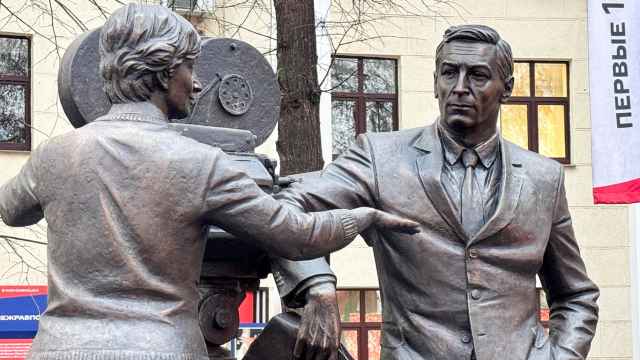When I came back to Moscow after a year of living in New York, the thing I thought I was going to miss the most was New York’s incredible concert scene. But it turned out that while I was away things had changed for the better. Social networks made it possible for self-produced artists to emerge and release their music online. New clubs, oriented at promoting independent music and new artists, opened while the established venues also started to occasionally venture into this new territory.
The frequency of interesting concerts is quite uneven. Sometimes you go to one concert a week, sometimes two or even more. And then there are times like my recent four-day-long concert marathon.
It started with Sansara’s acoustic concert at Artefaq (32/1 Ulitsa Bolshaya Dmitrovka; +7 495-650-3971), which was mostly just the two leaders Alexander Gagarin and Felix Bondaryov strumming guitars. Sansara is a Yekaterinburg-based band (although Felix lives in St. Petersburg) that has been around for more than 15 years but recently became increasingly popular. Their last album, “Igla” (Needle), was named one of the most significant of 2012.
Artefaq is ideal for these kinds of cozy small concerts; their sound system is great. But, when SBPCh (Samoye Bolshoye Prostoye Chislo) played there a couple of months ago, it was so packed that it was almost impossible to make it to the bar to get a beer.
The next day, I went to see Jenia Lubich at Masterskaya (3/3 Teatralny Proyezd; +7 495-625-6836). I wanted to see Lubich ever since this Nouvelle Vague alumna sang her famous lines: “I am a simple Russian girl, I’ve got vodka in my blood.” Lubich was amazing live. Her songs were in English, Russian and French. People sang along regardless of the language. You can next see her on March 22 at Artefaq.
Masterskaya, which just celebrated its four-year anniversary, is probably one of the best places to spend an evening. The Long Island here is a killer, and the food is pretty good, especially the beef Stroganoff and the pizza. Masterskaya also serves as a venue for theater performances, which explains why some elements of the interior look like stage decorations. There is an awning above the tables with a ladder going up on one side. There is also a lit-up window high in the wall above the bar where you can see mysterious figures moving, which is probably a glimpse of the kitchen.
On the third day, I saw a band called AKUTE from Mogilyov, Belarus, play at Chinatown Cafe (25/12 Lubyansky Proyezd; +7 495-623-6163) in Kitai-Gorod. Although I’ve never heard of AKUTE before, I tend to trust Chinatown Cafe’s choice of bands. It has also been recommended by Lyapis Trubetskoy, probably the best-known musician from Belarus.
The alcohol license at Chinatown Cafe was temporarily suspended, and we had to go next door to Kitaisky Lyotchik Jao-Da to fuel up with whiskey. The name of the club, which is in the basement of the same building, translates as “Chinese Pilot Jao-Da,” another Chinese reference in this neighborhood, although its name doesn’t have anything to do with China and possibly comes from the word kita, special types of construction beams used until the 17th century.
Lyapis Trubetskoy turned out to be right. AKUTE gave a terrific performance, and even though they sang in Belarussian, you could guess the meaning, at least that of the refrains. The next two concerts at Chinatown Cafe that I am definitely going to will be Gorodok Chekistov (Town of Chekists) on March 20 and Cassiopeia (again from Minsk) on March 28.
On the final day of my concert marathon, I went to Gogol (11 Stoleshnikov Pereulok; +7 495-514-0944) to see another band from Belarus, Petlya Pristrastiya. Gogol is one of the larger medium-sized clubs where you can almost always find a spot at the bar or a table.
Before the band came onstage, I sat down to have a bite and discovered Michael Idov, GQ Russia’s editor-in-chief, sitting at the other end of the table. Turned out that he was quite a fan of Petlya Pristrastiya and had been for some time. He then went closer to the stage, and two songs into the performance of the night’s other artist, Kira Lao, he showed me the “thumbs up.”
Kira Lao, from Veliky Novgorod, was hailed as the discovery of the year back in 2010 when she played a mix of trip-hop and ethnic folk and sang in English. But now that she moved to Moscow and put together a new band, she started playing darker music with Russian lyrics. Kira Lao will celebrate her birthday with a solo show at Masterskaya on March 17.
Petlya Pristrastiya is a rather unusual name for a rock band. It literally means “Noose of Prejudice.” Petlya’s music can be characterized as post-punk, and the performance was both energetic and danceable. Although there were not that many people at the venue, the floor literally shook throughout the concert.
There will be several concerts of interest at Gogol in the weeks to come, notably Markscheider Kunst on March 15 and SBPCh on March 21.
When Petlya Pristrastiya finished playing and I sat down with my friends for one more beer, I realized it was the fourth night in a row that I spent at a concert. We drank to that and to many more weeks like this to come.
Contact the author at [email protected]
A Message from The Moscow Times:
Dear readers,
We are facing unprecedented challenges. Russia's Prosecutor General's Office has designated The Moscow Times as an "undesirable" organization, criminalizing our work and putting our staff at risk of prosecution. This follows our earlier unjust labeling as a "foreign agent."
These actions are direct attempts to silence independent journalism in Russia. The authorities claim our work "discredits the decisions of the Russian leadership." We see things differently: we strive to provide accurate, unbiased reporting on Russia.
We, the journalists of The Moscow Times, refuse to be silenced. But to continue our work, we need your help.
Your support, no matter how small, makes a world of difference. If you can, please support us monthly starting from just $2. It's quick to set up, and every contribution makes a significant impact.
By supporting The Moscow Times, you're defending open, independent journalism in the face of repression. Thank you for standing with us.
Remind me later.






